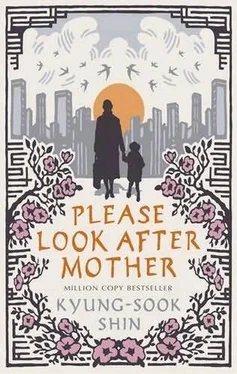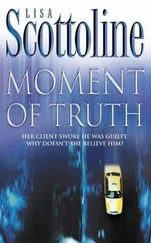When you said, “Mom can get lost, you know,” your sister-in-law widened her eyes in surprise. “You know how Mom is these days,” you explained, and your sister-in-law made a face, as if she had no idea what you were talking about. But your family knew what Mom was like these days. And knew that you might not be able to find her.

When was it you realized that Mom didn’t know how to read?
· · ·
You wrote your first letter when you jotted down what Mom dictated to send to Hyong-chol, soon after he moved to the city. Hyong-chol graduated from high school in the small village you were all born in, studied at home for the civil-service exam for a year, and went to the city for his first assignment. It was the first parting between Mom and one of her children. Back then, your family didn’t have a phone, and the only way to communicate was through letters. Hyong-chol sent her letters written in large type. Your mom always intuitively knew when Hyong-chol’s letters would arrive. The mailman came around eleven in the morning with a large bag hanging from his bicycle. On the days when Hyong-chol’s letters arrived, Mom would come in from the fields, or from the creek where she would be doing the laundry, to receive the letter personally from the mailman. Then she waited for you to come home from school, led you to the back porch, and took out Hyong-chol’s letter. “Read it out loud,” she would tell you.
Hyong-chol’s letters always started with “Dearest Mother.” As if he were following a textbook on how to write letters, Hyong-chol asked after the family and said he was doing well. He wrote that he brought his laundry to Father’s cousin’s wife once a week, and that she washed it for him, as Mom had asked her to do. He reported that he was eating well, that he had found a place to sleep as he had started staying overnight at work, and asked her not to worry about him. Hyong-chol also wrote that he felt he could do anything in the city, and that there were many things he wanted to do. He even revealed his ambition to become a success and give Mom a better life. Twenty-year-old Hyong-chol gallantly added, So, Mother, do not worry about me, and please take care of your health . When you peeked over the letter at Mom, you would see her staring at the taro stalks in the back yard, or at the ledge of tall clay jars filled with sauces. Your mom’s ears would be cocked like a rabbit’s, trying not to miss a single word. After you finished reading the letter, your mom instructed you to write down what she would tell you. Mom’s first words were “Dear Hyong-chol.” You wrote down, Dear Hyong-chol . Mom didn’t tell you to put a period after it, but you did. When she said, “Hyong-chol!” you wrote down, Hyong-chol! When Mom paused after calling his name, as if she’d forgotten what she wanted to say, you tucked strands of your bob behind your ear and waited attentively for your mom to continue, ballpoint pen in hand, staring down at the stationery. When she said, “The weather’s turned cold,” you wrote, The weather has turned cold . Mom always followed “Dear Hyong-chol” with something about the weather: “There are flowers now that it’s spring.” “It’s summer, so the paddy bed is starting to dry and crack.” “It’s harvest season, and there are beans overflowing on the paddy banks.” Mom spoke in your regional dialect unless it was to dictate a letter to Hyong-chol. “Don’t worry about anything at home, and please take care of yourself. That is the only thing your mother wishes from you.” Mom’s letters always swelled with a current of emotion: “I am sorry that I can’t be of any help to you.” As you carefully wrote down Mom’s words, she would shed a fat tear. The last words from your mom were always the same: “Make sure you eat all your meals. Mom.”
As the third of five children, you witnessed Mom’s sorrow and pain and worry when each of your older brothers left home. Every morning at dawn after Hyong-chol left, Mom would clean the surface of the glazed clay sauce-jars on the ledge in the back yard. Because the well was in the front yard, it was cumbersome to bring water to the back, but she washed each and every jar. She took off all the lids and wiped them clean, inside and out, until they shone. Your mom sang quietly. “If there were no sea between you and me there wouldn’t be this painful goodbye…” Her hands busily dipping the rag in cold water and lifting it out and wringing it and rubbing the jars, Mom sang, “I hope you won’t leave me one day.” If you called to her at that moment, she would turn around with tears welling in her big, guileless eyes.
Mom’s love for Hyong-chol was such that she used to make a bowl of ramen only for him, when he came home after remaining at school till late at night to study. Later, when you brought that up sometimes, your boyfriend, Yu-bin, would reply, “It’s just ramen-what’s the big deal?”
“What do you mean, what’s the big deal? Ramen was the best thing back then! It was something you ate in secret so you wouldn’t have to share it!” Even though you explained its significance, he, a city boy, seemed to think it was nothing.
When this new delicacy called ramen entered your lives, it overwhelmed every dish Mom had ever made. Mom would buy ramen and hide it in an empty jar in the row of clay jars, wanting to save it for Hyong-chol. But even late at night, the smell of boiling ramen would nudge you and your siblings awake. When Mom said, sternly, “You all go back to bed,” you would all look at Hyong-chol, who was about to eat. Feeling sorry, he would offer each of you a bite. Mom would remark, “How is it that you all come so quickly when it has to do with food?” and fill the pot with water, make another ramen, and divide it among you and your siblings. You would be so pleased, each holding a bowl filled with more soup than noodles.
After Hyong-chol had left for the city, when Mom reached the clay jar she used to hide the ramen in, she would call out, “Hyong-chol!” and sink down, her legs giving way. You would slip the rag from Mom’s grasp, lift her arm up, and drape it around your shoulder. Your mom would break out in sobs, unable to control her overflowing feelings for her firstborn.
When Mom sank into sorrow after your brothers left, the only things you could do for her were to read your brothers’ letters out loud, and to slip her responses into the mailbox on the way to school. Even then, you had no idea that she had never once set foot in the world of letters. Why did it never occur to you that Mom didn’t know how to read or write, even when she relied on you as a child, even after you read her the letters and wrote replies for her? You took her request as just another chore, similar to heading out to the garden to pick some mallow or going to buy some kerosene. Mom must not have given that task to anyone else after you left home, because you never received a letter from her. Was it because you didn’t write her? It was probably because of the phone. Around the time you left for the city, a public phone was installed in the village head’s house. It was the first phone in your birthplace, a small farming community where, once in a while, a train would clatter along tracks that stretched between the village and the vast fields. Every morning, the villagers heard the village head testing the mike then announcing that so and so should come over to answer a call from Seoul. Your brothers started to call the public phone. After the phone was installed, people who had family in other cities paid attention to the sounds of the microphone, even from paddies or fields, wondering who was being sought.

Either a mother and daughter know each other very well, or they are strangers.
Читать дальше













